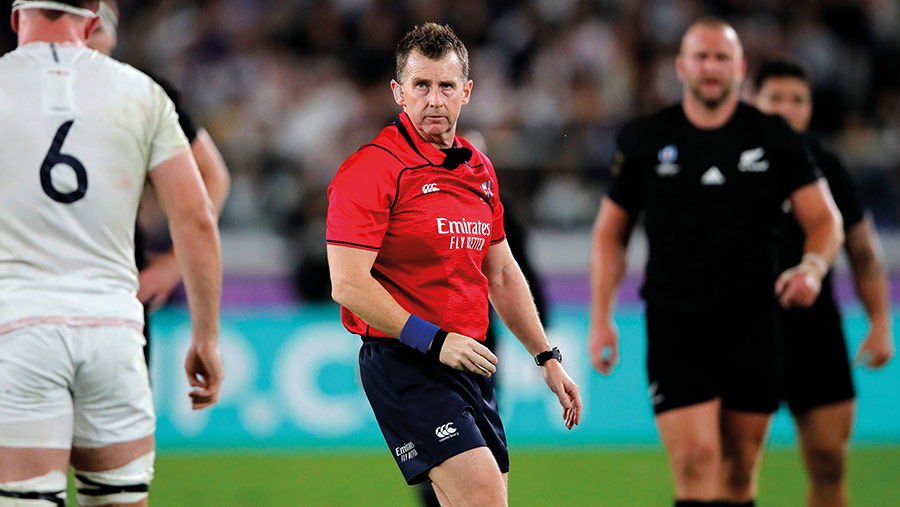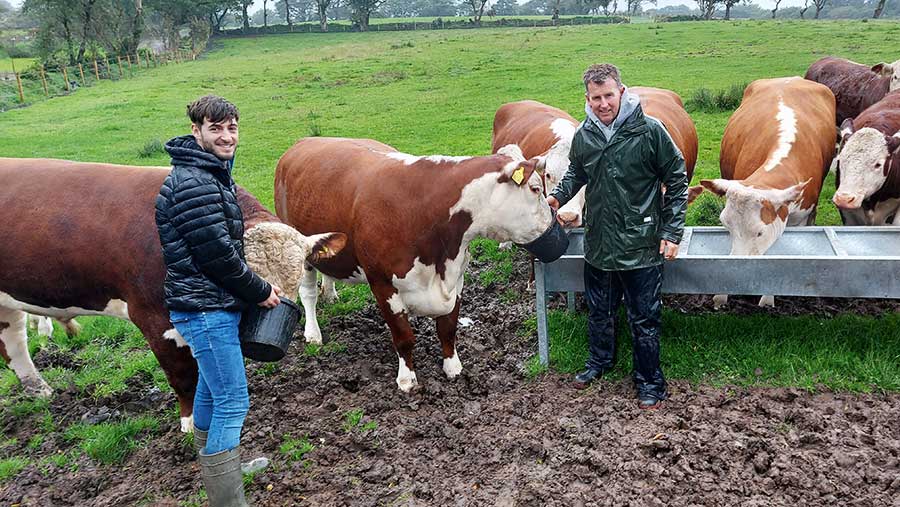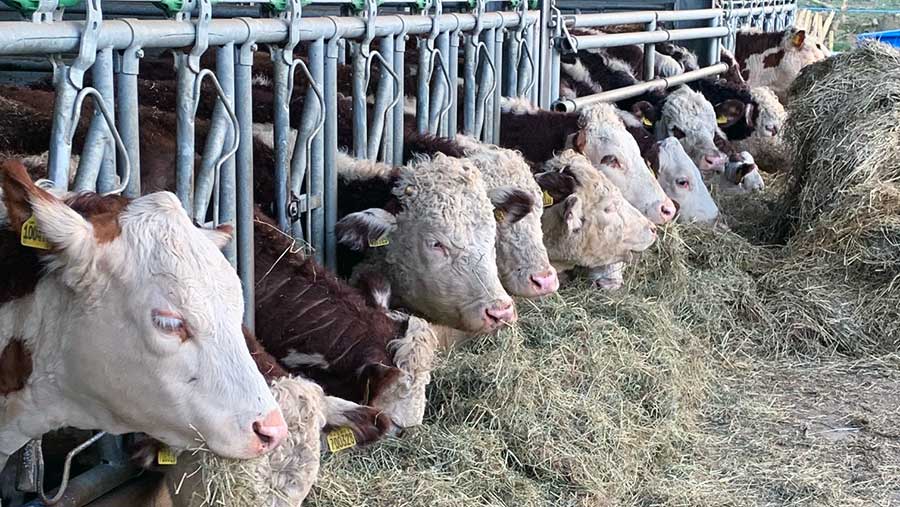Top rugby referee Nigel Owens kicks off his farming venture
 Nigel Owens as the proud owner of his new New Holland tractor © Nigel Owens
Nigel Owens as the proud owner of his new New Holland tractor © Nigel Owens It wasn’t just his quiet home in west Wales that everybody’s favourite rugby referee was flying home to, after a hectic stint at the World Cup in Japan.
Everything was in place for Nigel Owens’ long-held farming ambition to become a reality the moment he landed back in the UK last November.
After eight weeks overseeing top-level matches like the gripping England v New Zealand semi-final, Nigel was itching to get away from bustling Tokyo and back to the rolling hills of his home county, Carmarthenshire.

Nigel Owens on the rugby field. © Christophe Ena/AP/Shutterstock
See also: Young pig farmer calls time on casual racism in agriculture
As he returned to his village, nestled in the Gwendraeth Valley some 15 miles north-west of Swansea, a pasture was lying in wait, conveniently located over the hedge from his bungalow.
There, a freshly-constructed cattle shed stood vacant on the sideline.
Inbound were the first pedigree Hereford team members of the Mairwen herd – named after Nigel’s late-mother, Rhachel Mairwen Owens.
“I got four heifers and also got a bull off of my cousin with the aim of building up to about 15 head of cattle,” says the 49-year-old, surrounded by rugby memorabilia in his kitchen-diner.
His cousin, Helen Davies, and her husband, Gwyndaf, breed pedigree Herefords in Ceredigion.
“I really had a lot of help from Gwyndaf. Going up there for Christmas dinner every year with my dad and uncle, and to see their cattle, is when I decided I was going to get a smallholding and a Hereford herd going.”
Bit by bit, he’s been busy buying in breeding stock, and the herd now stands at 27, including three calves born in April. The first, a bull calf, is named after his dad, Geraint.
Calving was a big moment for him. “There’s been two times when I’ve been nervous in my life. One was reffing the World Cup final [between New Zealand and Australia in 2015] and the other one was coming out all those years ago,” he says. But he doesn’t think he has ever been as nervous as when he was expecting his first cow to calve.
It’s thought that the 2019 World Cup may be Nigel’s last as a referee, and he admits he has been contemplating what will occupy his time and mind, whenever he does decide to blow the final whistle. The cows are clearly his new passion project.
“There’s something very relaxing about walking through the fields and checking on them, and it has been very exciting so far,” he says.
Farming origins
This isn’t his first experience of working with cattle, however.
Long before he was charging around the rugby pitch keeping order and dishing out discipline in his trademark style, the world’s best rugby referee started out working on a dairy farm near his childhood home in the village of Mynyddcerrig when he was 15 years old. He was a keen member of Llanarthne Young Farmers Club, too.
Much of his summer holidays as a child was spent on the farm of his late uncle, Graham Howells, and his wife, Gloria, where they had a Hereford bull running with the dairy herd.
“This is where I fell in love with the Herefords as a young boy. They have a lovely temperament, are easy-calving and they are a native breed,” he says.
Pushed on why he opted for a breed native to a county which sits on the other side of the Welsh border, he laughs: “Well, Herefordshire was in Wales until the English stole it.”
See also: Britain’s Fittest Farmer 2020 – extra time to apply
As a teenager, he went to college twice a week to learn agricultural studies, with the rest of his time spent working on the dairy unit at Wern Farm in nearby Llanelli.
“I owe so much to the farm owners Howard and Margaret Roberts and the family for my love of farming. The little I know, I learnt most of it there with them.”
Today, he’s getting breeding advice from their son, Neville, who runs a prize-winning Holstein herd at the same farm.

Nigel Owens with partner Barrie Jones-Davies (left) © Oli Hill
Drawing on his early experiences of working with cattle and the advice of farming relatives and friends, he says he has no intention of employing a farm manager. He will run the herd himself with the help of partner Barrie Jones-Davies, who is from a farming family, and his dad, now in his mid-80s but keen as ever to muck in.
He’s clear that without support, he wouldn’t have been able to kickstart his own herd.
“Robin Quinn, who I purchased my first Herefords from, knows his bloodlines and has become a good friend. He’s been so helpful in helping me get started and is always giving guidance.”
Cattle shed design and assistance came from Neil Bartholemew of Pembrokeshire-based Farmtec. He suggested Nigel name the herd after his mum, who died of cancer in 2009.
Head in the game
Having started out with the idea of owning a modest handful of cattle only a matter of months ago, Nigel admits that his enthusiasm is feeding an insatiable appetite to do more and confesses may have got carried away with buying machinery.
He’s bought a New Holland tractor, and all the kit to mitigate much need for contractor support.
Now his target head count is about 50, he owns just shy of 37ha, rents an additional 11ha and he’s thinking about launching a beef box scheme.
See also: Video: 6 simple exercises to keep you fit on the farm
“Covid has helped us get well established – I’ve done years of work in just a few months,” he says, describing the labour-intensive job of bringing the land he bought up to scratch, reclaiming overgrown corners, putting in fences and rejuvenating grass and soils.
“Since starting, I’ve been obsessed with the weather. I check the forecast every day and it’s always too dry or too hot,” he says as a July shower drums at his window.

Hereford cattle in a newly constructed shed next to Nigel Owens’ home in west Wales © Nigel Owens
With rugby fixtures resuming in August, Nigel says he may have to rely on his partner and dad to help keep the farm in check while he’s away herding beefy blokes instead of his beloved beef cattle.
His pride extends far beyond his own holding though, as demonstrated by his impromptu reffing of unfair or false accusations on animal welfare and the environment hurled at farmers on Twitter.
See also: Tom Youngs talks Six Nations, sport and life on the farm
This is where decades spent calmly and decisively putting an end to disputes on the pitch come in to their own.
“I do feel quite passionate about it. There are some out there hijacking issues to push their own agenda and that’s what I don’t agree with.
“But I do think that the farming community could sell itself better and I don’t think we do enough to show the positives,” he adds.
